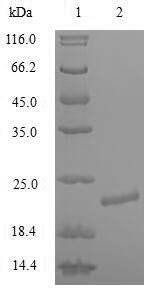The production of recombinant human potassium voltage-gated channel subfamily A member 1 (KCNA1) in E. coli involves co-cloning the gene encoding the partial KCNA1 protein (1-154aa) into an expression vector with an N-terminal 6xHis-tag gene and transforming it into E. coli cells. These cells are cultured under conditions that induce protein expression. After sufficient growth is achieved, the cells are lysed to release the recombinant KCNA1 protein. Purification is achieved using affinity chromatography method. The purity of the KCNA1 protein is assessed using SDS-PAGE, reaching over 90%.
The human KCNA1 gene encodes the potassium voltage-gated channel subfamily A member 1 (Kv1.1). This voltage-gated potassium channel regulates the excitability of neurons, muscles, and sensory cells [1]. Kv1.1 channels repolarize the membrane potential and shape action potentials in various tissues, including the heart and the central nervous system [1]. Mutations in the KCNA1 gene have been associated with neurological disorders such as episodic ataxia type 1 [1].
The KCNA1 gene belongs to the larger family of potassium voltage-gated channels, which includes various subfamilies such as KCNQ, KCNH, and KCNB. These channels are essential for mediating potassium ion permeability across cell membranes, thereby influencing cell excitability and function. The KCNA1 dysfunction can disrupt neuronal signaling and muscle contraction, manifesting as neurological and neuromuscular disorders [1].
References:
[1] C. Qu, J. Sun, Y. Liu, X. Wang, L. Wang, C. Hanet al., Caveolin‑1 facilitated kcna5 expression, promoting breast cancer viability, Oncology Letters, 2018. https://doi.org/10.3892/ol.2018.9261






